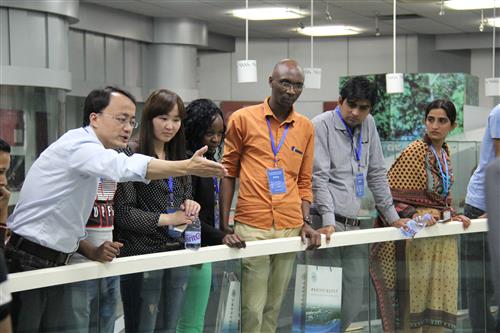
From April 24 to 28, the 2015 Cutting-edge and Interdisciplinary Sciences Spring School For Overseas Doctoral Candidates was held in Nanjing. The Spring School was co-sponsored by the International College of UCAS, the Institute of Soil Science and the Nanjing Institute of Geography & Limnology. 30 students from 12 countries and 17 institutes of CAS gathered in Nanjing for five days. The Spring School strengthened communication between UCAS and CAS institutes, utilizing CAS intelligence and scientific resources, accelerating scientific-educational integration.
Implementing the CAS strategy of scientific-educational integration and the national strategy for environment and agriculture, under the theme of “Ecology, Environment and Agriculture”, the Spring School invited 11 professors from the Technology University of Denmark, the Institute of Soil Science, the Nanjing Institute of Geography & Limnology, Nanjing Normal University, Nanjing Agriculture University and the Nanjing Academy of Agricultural Sciences to address students as well as arranging student visits to related research facilities. The Spring School enables young international students to update their understanding of cutting-edge and interdisciplinary sciences through seminar discussions and fieldwork, thereby facilitating their understanding of scientific research topics. The students also visited the Soil Specimens Museum of the Institute of Soil Science and the Institute History Museum of the Nanjing CAS Institute of Geography & Limnology.
The 2015 Cutting-edge and Interdisciplinary Sciences Spring School For Overseas Doctoral Candidates built on the success of the 2014 Spring School. It was the first time for the International College to cooperate with related institutes in such a training program. It not only provided a very good opportunity for the International College and the CAS institutes to establish a regular communication model, and to accelerate scientific-educational integration and development by both sides, but it also promoted the cultivation of international students and the internationalization of UCAS and the CAS institutes.
By Tan Yudong
